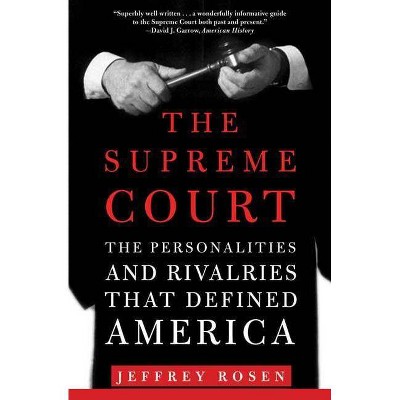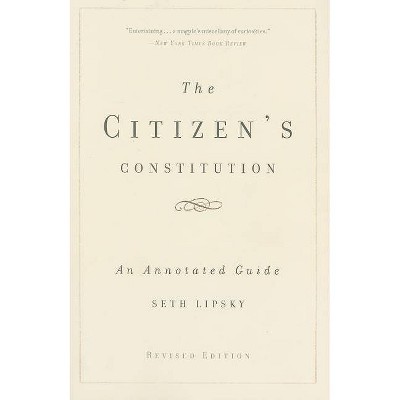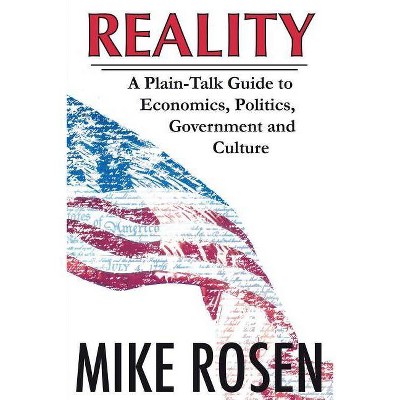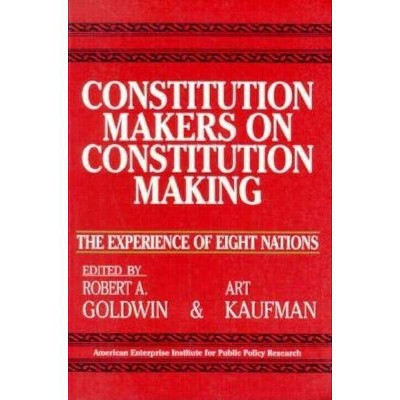Constitution 3.0 - by Jeffrey Rosen & Benjamin Wittes (Paperback)
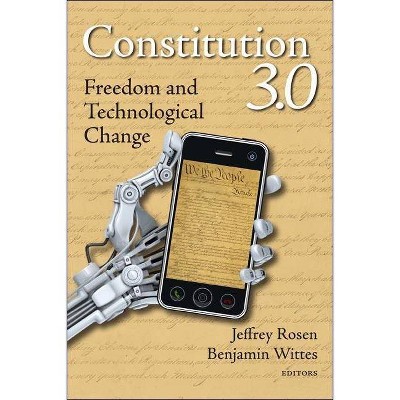
Similar Products
Products of same category from the store
AllProduct info
<p/><br></br><p><b> About the Book </b></p></br></br><p>At the beginning of the twenty-first century, breathtaking changes in technology are posing stark challenges to our constitutional values. From free speech to privacy, from liberty and personal autonomy to the right against self-incrimination, basic constitutional principles are under stress from technological advances unimaginable even a few decades ago, let alone during the founding era. In this provocative collection, America's leading scholars of technology, law, and ethics imagine how to translate and preserve constitutional and legal values at a time of dizzying technological change.</p> <p> <i>Constitution 3.0</i> explores some of the most urgent constitutional questions of the near future. Will privacy become obsolete, for example, in a world where ubiquitous surveillance is becoming the norm? Imagine that Facebook and Google post live feeds from public and private surveillance cameras, allowing 24/7 tracking of any citizen in the world. How can we protect free speech now that Facebook and Google have more power than any king, president, or Supreme Court justice to decide who can speak and who can be heard? How will advanced brain-scan technology affect the constitutional right against self-incrimination? And on a more elemental level, should people have the right to manipulate their genes and design their own babies? Should we be allowed to patent new forms of life that seem virtually human? The constitutional challenges posed by technological progress are wide-ranging, with potential impacts on nearly every aspect of life in America and around the world.</p> <p>The authors include Jamie Boyle, Duke Law School; Eric Cohen and Robert George, Princeton University; Jack Goldsmith, Harvard Law School; Orin Kerr, George Washington University Law School; Lawrence Lessig, Harvard Law School; Stephen Morse, University of Pennsylvania Law School; John Robertson, University of Texas Law School; Christopher Slobogin, Vanderbilt Law School; O. Carter Snead, Notre<p/><br></br><p><b> Book Synopsis </b></p></br></br><p>At the beginning of the twenty-first century, breathtaking changes in technology are posing stark challenges to our constitutional values. From free speech to privacy, from liberty and personal autonomy to the right against self-incrimination, basic constitutional principles are under stress from technological advances unimaginable even a few decades ago, let alone during the founding era. In this provocative collection, America's leading scholars of technology, law, and ethics imagine how to translate and preserve constitutional and legal values at a time of dizzying technological change.</p> <p> <i>Constitution 3.0</i> explores some of the most urgent constitutional questions of the near future. Will privacy become obsolete, for example, in a world where ubiquitous surveillance is becoming the norm? Imagine that Facebook and Google post live feeds from public and private surveillance cameras, allowing 24/7 tracking of any citizen in the world. How can we protect free speech now that Facebook and Google have more power than any king, president, or Supreme Court justice to decide who can speak and who can be heard? How will advanced brain-scan technology affect the constitutional right against self-incrimination? And on a more elemental level, should people have the right to manipulate their genes and design their own babies? Should we be allowed to patent new forms of life that seem virtually human? The constitutional challenges posed by technological progress are wide-ranging, with potential impacts on nearly every aspect of life in America and around the world.</p> <p>The authors include Jamie Boyle, Duke Law School; Eric Cohen and Robert George, Princeton University; Jack Goldsmith, Harvard Law School; Orin Kerr, George Washington University Law School; Lawrence Lessig, Harvard Law School; Stephen Morse, University of Pennsylvania Law School; John Robertson, University of Texas Law School; Christopher Slobogin, Vanderbilt Law School; O. Carter Snead, Notre Dame Law School; Jeffrey Rosen, George Washington University Law School; Benjamin Wittes, Brookings Institution; Tim Wu, Columbia Law School; and Jonathan Zittrain, Harvard Law School.</p><p/><br></br><p><b> Review Quotes </b></p></br></br><br><P>" "Constitution 3.0" is a remarkable and provocative book that tackles one of law--and society's--most important questions: How will new technologies intersecting all aspects of our lives affect our constitutional rights and our approach to a document written more than two centuries ago? In this invaluable contribution, Jeffrey Rosen and Benjamin Wittes, two of the nation's sharpest legal thinkers, ask some of the nation's preeminent scholars to look to the future and predict how cutting-edge technologies will coexist with one of the world's oldest constitutions."--Jan Crawford, CBS News Chief Legal and Political Correspondent, author, "Supreme Conflict"<br><br><P>""An invaluable roadmap for responding to the challenge of adapting our constitutional values to future technological developments.""-- "POLITICO"<br><br><P>"In this terrific new anthology, some of the country's most original constitutional thinkers set themselves to imagining a brave new world of 24 hour surveillance, Facebook snooping, neurological sentencing, biothreats, robots, and more. Each author tries to map these emerging technologies onto existing constitutional doctrine and reflect on how the current doctrine must stretch to accommodate, or risk failing us. This is a thrilling, terrifying account of technology that has come to define us, and a challenge to think in new ways about our most fundamental values."--Dahlia Lithwick, "Slate" senior editor<br><br><P>"In this thought-provoking collection of essays by a distinguished group of scholars, Jeffrey Rosen and Ben Wittes take us on a magical journey to the Constitution's future, posing hard questions about how to translate our commitments to freedom and equality to a technologically advanced world. This is a fascinating book that anyone interested in the problems of technological change should read."--Jack M. Balkin, Knight Professor of Constitutional Law and the First Amendment, Yale Law School<br><p/><br></br><p><b> About the Author </b></p></br></br><p> <b>Jeffrey Rosen</b> is a professor of law at the George Washington University Law School, the legal affairs editor of <i>The New Republic</i>, and a nonresident senior fellow at Brookings. His books include <i>The Unwanted Gaze</i>, <i>The Naked Crowd</i>, and <i>The Supreme Court</i>.</p> <p> <b>Benjamin Wittes</b> is a senior fellow in Governance Studies at the Brookings Institution. He is the author of <i>Law and the Long War</i> and <i>Detention and Denial</i>.</p>
Price History
Price Archive shows prices from various stores, lets you see history and find the cheapest. There is no actual sale on the website. For all support, inquiry and suggestion messagescommunication@pricearchive.us


